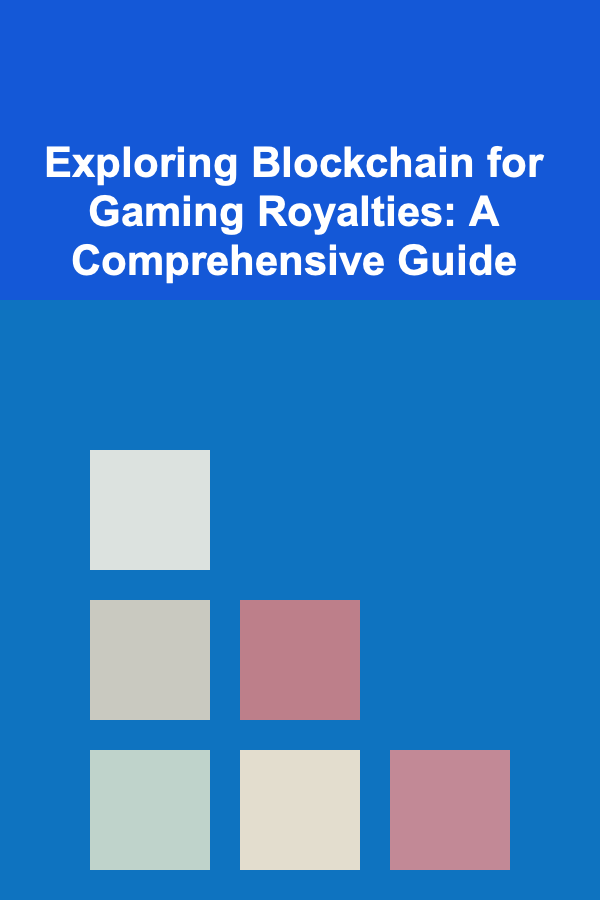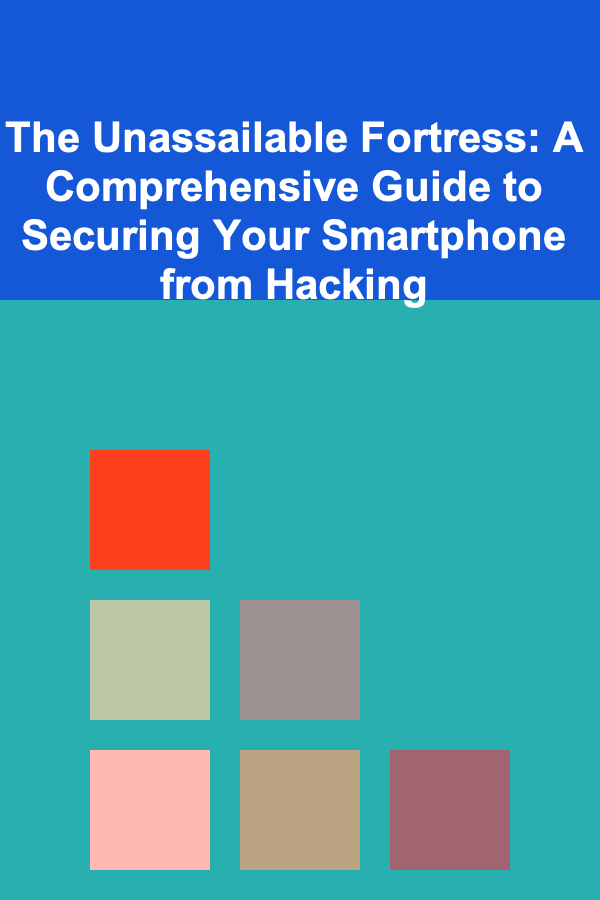
Exploring Blockchain for Gaming Royalties: A Comprehensive Guide
ebook include PDF & Audio bundle (Micro Guide)
$12.99$8.99
Limited Time Offer! Order within the next:

Introduction: The Challenge of Gaming Royalties and the Promise of Blockchain
The gaming industry, a multi-billion dollar behemoth, has long grappled with the complexities of royalty management. Traditional royalty systems are often opaque, inefficient, and prone to disputes. Developers, artists, and musicians involved in game creation rely on royalties for their ongoing compensation, yet tracking usage, calculating payments, and ensuring transparency can be a logistical nightmare. The current landscape frequently involves lengthy audits, complex contracts, and delayed payments, leading to frustration and mistrust among stakeholders. The reliance on centralized databases and intermediaries introduces vulnerabilities and opportunities for errors or manipulation.
Enter blockchain technology. Blockchain, with its inherent characteristics of decentralization, transparency, and immutability, offers a compelling solution to revolutionize gaming royalties. It provides a secure and auditable platform for tracking game asset usage, automating royalty calculations, and facilitating direct payments to rights holders. By leveraging the power of smart contracts, blockchain can create a transparent and efficient royalty ecosystem, fostering greater trust and collaboration within the gaming industry.
This guide delves into the potential of blockchain to transform gaming royalties, exploring the challenges of traditional systems, the benefits of blockchain adoption, the technical considerations involved in implementation, real-world use cases, and the future outlook for this exciting intersection of gaming and technology. We'll examine how blockchain can empower creators, streamline operations for game publishers, and ultimately create a fairer and more sustainable gaming ecosystem.
The Pain Points of Traditional Gaming Royalty Systems
Before exploring the blockchain solution, it's crucial to understand the inherent inefficiencies and challenges present in traditional gaming royalty systems. These pain points directly impact creators and publishers alike:
- Lack of Transparency: Traditional systems often operate as "black boxes," with limited visibility into how royalties are calculated and distributed. Creators often lack access to the underlying data supporting royalty statements, making it difficult to verify accuracy and identify discrepancies. This lack of transparency fosters mistrust and can lead to disputes.
- Complex and Manual Processes: Royalty calculations can be incredibly complex, involving numerous variables such as sales figures, geographic regions, usage rights, and contractual agreements. Manual processes are prone to errors, time-consuming, and resource-intensive. Data entry, reconciliation, and reporting are often performed manually, increasing the risk of inaccuracies and delays.
- Inefficient Payment Processing: Royalty payments are often processed through multiple intermediaries, including distributors, publishers, and collection agencies. Each intermediary takes a cut, reducing the final payout to creators. Payment delays are common, as funds are routed through various accounts and subject to administrative processing. International payments can be particularly challenging, involving currency conversions, cross-border regulations, and potential delays.
- High Administrative Costs: The administrative overhead associated with managing royalties can be significant. Publishers must maintain detailed records, track usage rights, calculate payments, and generate royalty statements. Audits are frequently required to ensure accuracy and compliance, adding further expense. The costs associated with legal counsel, accounting services, and dispute resolution can also be substantial.
- Potential for Disputes: The lack of transparency, complex calculations, and potential for errors create fertile ground for disputes. Disagreements over usage rights, royalty rates, and payment amounts can lead to costly and time-consuming legal battles. The power imbalance between creators and publishers can further exacerbate these disputes.
- Limited Tracking of Microtransactions and In-Game Assets: With the rise of in-game purchases and digital assets, tracking usage and distributing royalties for these items becomes even more challenging. Traditional systems often lack the granularity and scalability to effectively manage royalties for microtransactions, skins, and other virtual goods.
- Vulnerability to Fraud: The reliance on centralized databases and manual processes makes traditional systems vulnerable to fraud. Sales figures can be manipulated, usage data can be falsified, and royalties can be misappropriated. The lack of transparency makes it difficult to detect and prevent fraudulent activity.
These challenges highlight the need for a more efficient, transparent, and secure royalty management system, paving the way for blockchain adoption.
Blockchain Solutions for Gaming Royalties: A New Paradigm
Blockchain technology offers a compelling solution to address the challenges inherent in traditional gaming royalty systems. Its decentralized, transparent, and immutable nature provides a foundation for building a fairer and more efficient royalty ecosystem. Here's how blockchain can revolutionize gaming royalties:
- Smart Contracts for Automated Royalty Distribution: Smart contracts, self-executing agreements written in code and deployed on the blockchain, automate the entire royalty process. They define the terms of the royalty agreement, including royalty rates, payment schedules, and distribution rules. When predefined conditions are met (e.g., a game is sold, an asset is used), the smart contract automatically triggers the royalty payment, ensuring timely and accurate distribution. This eliminates the need for manual intervention and reduces the risk of errors or delays.
- Transparency and Auditability: All royalty transactions are recorded on the blockchain, providing a transparent and auditable record of every payment. Creators can easily verify the accuracy of royalty statements by accessing the blockchain data. This increased transparency fosters trust and reduces the potential for disputes. The immutable nature of the blockchain ensures that records cannot be altered or deleted, providing a secure and reliable audit trail.
- Direct Payments to Creators: Blockchain enables direct payments from game publishers to creators, eliminating the need for intermediaries and reducing payment delays. Creators receive their royalties directly into their digital wallets, without the fees and delays associated with traditional payment methods. This empowers creators and allows them to retain a larger share of their earnings.
- Real-time Royalty Tracking: Blockchain allows for real-time tracking of game asset usage, providing creators with up-to-the-minute insights into their earnings. This enables them to make informed decisions about their creative work and adjust their strategies accordingly. Real-time data also helps publishers optimize their royalty programs and identify potential areas for improvement.
- Improved Efficiency and Reduced Costs: By automating the royalty process and eliminating intermediaries, blockchain significantly reduces administrative costs. The efficiency gains from automated calculations, direct payments, and real-time tracking translate into substantial cost savings for both creators and publishers.
- Enhanced Security: Blockchain's cryptographic security features protect royalty data from unauthorized access and manipulation. The decentralized nature of the blockchain makes it difficult for hackers to compromise the system. Smart contracts can be designed with security audits and safeguards to prevent vulnerabilities and ensure the integrity of the royalty process.
- Fractional Ownership and Royalty Sharing: Blockchain enables fractional ownership of game assets, allowing creators to share royalties with multiple contributors. This can be particularly beneficial for collaborative projects involving multiple artists, musicians, and developers. Smart contracts can automatically distribute royalties based on predetermined ownership percentages, ensuring fair compensation for all contributors.
- Support for Microtransactions and In-Game Assets: Blockchain provides a robust platform for tracking and distributing royalties for microtransactions and in-game assets. Smart contracts can be designed to automatically calculate and distribute royalties based on the usage of specific assets, ensuring that creators are fairly compensated for their contributions to the in-game economy.
By leveraging these capabilities, blockchain can transform gaming royalties from a cumbersome and opaque process into a streamlined, transparent, and equitable system.
Technical Considerations: Building a Blockchain-Based Royalty System
Implementing a blockchain-based royalty system requires careful consideration of various technical factors. Choosing the right blockchain platform, developing secure smart contracts, and integrating the system with existing gaming infrastructure are crucial for success.
- Choosing the Right Blockchain Platform: Several blockchain platforms are suitable for building royalty systems, each with its own strengths and weaknesses. Consider factors such as scalability, transaction fees, smart contract capabilities, and community support. Popular options include:
- Ethereum: The most widely used blockchain platform for smart contracts, offering a large developer community and a robust ecosystem of tools and libraries. However, Ethereum's transaction fees can be relatively high, particularly during periods of network congestion.
- Polygon (formerly Matic Network): A layer-2 scaling solution for Ethereum, offering faster transaction speeds and lower fees. Polygon is a good option for applications that require high throughput and low latency.
- Binance Smart Chain (BSC): A blockchain platform with faster transaction speeds and lower fees than Ethereum. BSC is compatible with Ethereum, making it easy to port existing Ethereum-based smart contracts.
- Flow: A blockchain specifically designed for NFTs and gaming, offering high scalability and low transaction fees. Flow is a good option for applications that involve a large number of NFT transactions.
- Tezos: A blockchain platform with a focus on governance and upgradability, offering built-in mechanisms for protocol upgrades and stakeholder participation.
- Smart Contract Development: Developing secure and efficient smart contracts is crucial for the success of a blockchain-based royalty system. Smart contracts should be thoroughly audited and tested to prevent vulnerabilities and ensure that they function as intended. Consider the following best practices:
- Use a reputable smart contract development framework: Frameworks such as Truffle and Hardhat provide tools and libraries that simplify the smart contract development process.
- Follow secure coding practices: Avoid common smart contract vulnerabilities such as reentrancy attacks, integer overflows, and denial-of-service attacks.
- Conduct thorough testing: Write unit tests and integration tests to ensure that the smart contracts function correctly under various conditions.
- Get your smart contracts audited by a reputable security firm: A professional security audit can identify potential vulnerabilities that may have been overlooked during development.
- Implement access control mechanisms: Restrict access to sensitive functions and data to authorized users only.
- Integration with Gaming Infrastructure: Integrating the blockchain-based royalty system with existing gaming infrastructure, such as game engines, distribution platforms, and payment gateways, is essential for seamless operation. This requires developing APIs and interfaces that allow the blockchain system to communicate with other systems. Consider the following integration challenges:
- Data Synchronization: Synchronize data between the blockchain system and existing gaming databases.
- Payment Processing: Integrate with payment gateways to facilitate cryptocurrency payments.
- Game Engine Integration: Integrate with game engines to track asset usage and trigger royalty payments.
- User Authentication: Develop secure user authentication mechanisms to protect user accounts and data.
- Data Storage and Management: Blockchain is not ideal for storing large amounts of data. Consider using off-chain storage solutions, such as IPFS (InterPlanetary File System), to store game assets and metadata. Use the blockchain to store only essential information, such as royalty agreements and transaction records.
- Scalability and Performance: Ensure that the blockchain-based royalty system can handle a large volume of transactions without compromising performance. Consider using scaling solutions such as layer-2 networks or sidechains to improve scalability.
- Legal and Regulatory Compliance: Ensure that the blockchain-based royalty system complies with all applicable legal and regulatory requirements, including copyright laws, data privacy regulations, and financial regulations. Consult with legal counsel to ensure compliance.
- Gas Optimization (Ethereum): When developing smart contracts for Ethereum (or other blockchains with gas fees), gas optimization is crucial to minimize transaction costs. Techniques include:
- Minimize storage usage: Storage operations are expensive. Store only necessary data on-chain and consider using off-chain storage for larger data sets.
- Batch operations: Perform multiple operations in a single transaction to reduce overhead.
- Use efficient data structures: Choose data structures that are optimized for the operations you need to perform. For example, mappings are generally more gas-efficient than arrays for lookups.
- Avoid unnecessary loops: Loops can be gas-intensive. Try to minimize the number of iterations or find alternative approaches.
- Use assembly code: For performance-critical sections of code, consider using assembly code to optimize gas usage. However, assembly code is more complex and requires a deeper understanding of the Ethereum Virtual Machine (EVM).
By carefully addressing these technical considerations, developers can build robust and scalable blockchain-based royalty systems that meet the needs of the gaming industry.
Real-World Use Cases: Blockchain Royalty Systems in Action
While still relatively nascent, the application of blockchain to gaming royalties is gaining traction, with several real-world use cases emerging. These examples demonstrate the potential of blockchain to transform the industry:
- Audius: A decentralized music streaming platform that uses blockchain to distribute royalties directly to artists. Audius allows artists to upload their music and set their own royalty rates. When users stream the music, royalties are automatically distributed to the artists through smart contracts.
- Ujo Music (ConsenSys): A platform that aims to create a transparent and decentralized music industry. Ujo Music uses blockchain to manage music rights, track usage, and distribute royalties to artists.
- Opulous: A platform that allows artists to tokenize their future royalties, enabling fans to invest in their favorite artists and earn a share of their future earnings. Opulous uses blockchain to manage the tokenization process and distribute royalties to token holders.
- NFT Marketplaces (OpenSea, Rarible, Magic Eden): Many NFT marketplaces incorporate royalty mechanisms for secondary sales. Creators specify a percentage royalty that is automatically paid to them whenever their NFT is resold. This is a built-in feature leveraging smart contracts and blockchain's immutability.
- In-Game Asset Royalty Systems: Some games are starting to experiment with using blockchain to manage royalties for in-game assets. For example, a game developer could create NFTs representing digital items and distribute royalties to the creators of those items whenever they are traded within the game or on external marketplaces.
- Decentralized Autonomous Organizations (DAOs) for Game Development: DAOs can be used to fund and manage game development projects, with royalties distributed to DAO members based on their contributions. This allows for a more collaborative and transparent approach to game development.
- Traceability of Game Assets: Blockchain can be used to track the provenance of game assets, ensuring that creators are properly credited and compensated for their work. This is particularly important for games that incorporate user-generated content.
These examples illustrate the diverse applications of blockchain for gaming royalties and demonstrate the potential to create a more equitable and sustainable ecosystem for creators.
The Future of Gaming Royalties on the Blockchain
The future of gaming royalties on the blockchain is bright, with significant potential for further innovation and adoption. As blockchain technology matures and becomes more widely accepted, we can expect to see the following trends:
- Increased Adoption by Major Game Publishers: As the benefits of blockchain become more apparent, major game publishers are likely to adopt blockchain-based royalty systems to streamline operations, reduce costs, and improve transparency.
- Integration with Existing Gaming Platforms: Blockchain-based royalty systems will be seamlessly integrated with existing gaming platforms, making it easier for creators and publishers to participate.
- Standardization of Royalty Protocols: Industry standards for blockchain-based royalty systems will emerge, facilitating interoperability and reducing complexity.
- Enhanced Security and Scalability: Blockchain platforms will continue to improve in terms of security and scalability, making them more suitable for managing large volumes of royalty transactions.
- More Sophisticated Smart Contract Applications: Smart contracts will become more sophisticated, enabling more complex royalty arrangements and automated dispute resolution mechanisms.
- Expansion to New Areas of the Gaming Industry: Blockchain-based royalty systems will be extended to new areas of the gaming industry, such as esports, virtual reality, and augmented reality.
- Growth of Decentralized Gaming Ecosystems: Blockchain will facilitate the growth of decentralized gaming ecosystems, where creators and players have greater control over their assets and earnings.
- Focus on User Experience: Improving the user experience of blockchain-based royalty systems will be critical for widespread adoption. This includes simplifying the onboarding process, making it easier to manage digital wallets, and providing intuitive interfaces for tracking royalties.
- Regulatory Clarity: As blockchain technology matures, we can expect greater regulatory clarity regarding the treatment of cryptocurrencies and blockchain-based royalties. This will provide greater certainty for creators and publishers and encourage further adoption.
- Interoperability Between Blockchains: Cross-chain solutions will enable royalty payments and asset transfers across different blockchain platforms, creating a more interconnected and seamless gaming ecosystem.
The widespread adoption of blockchain for gaming royalties has the potential to create a more equitable, transparent, and sustainable gaming ecosystem that benefits creators, publishers, and players alike.
Challenges and Considerations for Blockchain Adoption
Despite the potential benefits, adopting blockchain for gaming royalties also presents several challenges and considerations:
- Scalability: Some blockchain networks can struggle to handle the high volume of transactions required for a large-scale gaming royalty system. Scalability solutions, such as layer-2 networks and sharding, are being developed to address this challenge.
- Transaction Fees: Transaction fees on some blockchain networks can be high, making it expensive to process small royalty payments. Gas optimization techniques and alternative blockchain platforms with lower fees can help mitigate this issue.
- Volatility of Cryptocurrencies: The volatility of cryptocurrencies can make it difficult to predict the value of royalty payments. Stablecoins, which are pegged to a stable asset like the US dollar, can provide a more stable payment mechanism.
- Complexity of Smart Contracts: Developing and auditing smart contracts requires specialized expertise. It's important to work with experienced developers and security auditors to ensure that smart contracts are secure and function correctly.
- Legal and Regulatory Uncertainty: The legal and regulatory landscape surrounding blockchain and cryptocurrencies is still evolving. It's important to stay informed about the latest regulations and ensure compliance.
- User Adoption and Education: Many users are unfamiliar with blockchain technology and cryptocurrencies. Educational initiatives are needed to help users understand the benefits of blockchain-based royalty systems and how to use them.
- Integration with Legacy Systems: Integrating blockchain-based royalty systems with existing gaming infrastructure can be complex and challenging. Careful planning and execution are required to ensure a smooth transition.
- Environmental Concerns: Some blockchain networks, such as Bitcoin, consume a significant amount of energy. More energy-efficient consensus mechanisms, such as Proof-of-Stake, are being developed to address these environmental concerns.
- Security Risks: Blockchain systems are not immune to security risks, such as hacking and smart contract vulnerabilities. Robust security measures are needed to protect against these risks.
- Data Privacy: While blockchain provides transparency, it's important to address data privacy concerns. Techniques such as zero-knowledge proofs can be used to protect sensitive data.
Addressing these challenges will be crucial for the successful adoption of blockchain for gaming royalties.
Conclusion: Embracing the Future of Gaming Royalties
Blockchain technology holds immense potential to transform gaming royalties, addressing the inefficiencies and inequities of traditional systems. By leveraging smart contracts, transparency, and direct payments, blockchain can empower creators, streamline operations for game publishers, and foster a more sustainable gaming ecosystem. While challenges remain in terms of scalability, security, and regulatory clarity, the benefits of blockchain adoption are compelling.
As the gaming industry continues to evolve, embracing blockchain for royalty management is no longer a question of "if" but "when" and "how." By understanding the technical considerations, learning from real-world use cases, and addressing the challenges proactively, the gaming industry can unlock the full potential of blockchain to create a fairer, more transparent, and more rewarding future for all stakeholders.
The journey towards a blockchain-powered gaming royalty ecosystem is just beginning, but the possibilities are limitless. By embracing innovation and collaboration, we can create a future where creators are fairly compensated for their work, publishers can operate more efficiently, and players can enjoy a more immersive and rewarding gaming experience.
Reading More From Our Other Websites
- [Home Rental Property 101] How to Choose Between Long-Term vs. Short-Term Rentals
- [Home Soundproofing 101] How to Improve Soundproofing in Thin Walls Without Expensive Renovations
- [Needle Felting Tip 101] DIY Color Blending Techniques Using Needle Felting Yarn
- [Paragliding Tip 101] Smooth Touchdowns: Mastering the Flare Technique for Perfect Paragliding Landings
- [Biking 101] Top 5 Bike Tires for Durability and Performance
- [Home Staging 101] How to Stage Your Outdoor Spaces for Maximum Curb Appeal
- [Home Budget 101] How to Create a Budget-Friendly Home Office Setup
- [Needle Felting Tip 101] Wet Felting vs. Needle Felting: Which Technique Suits Your Creative Style?
- [Home Holiday Decoration 101] How to Create a Holiday Entryway with Wreaths and Garlands
- [Small Business 101] Best Niche Marketing Strategies for Eco‑Friendly Pet Product Start‑ups

How to Leverage Tax-Advantaged Accounts for Better Investment Returns
Read More
How to Manage Debt with a Debt Snowball or Debt Avalanche Method
Read More
How to Protect Your Rental Property from Common Damages
Read More
How To Connect Your Mind and Body in Yoga
Read More
The Unassailable Fortress: A Comprehensive Guide to Securing Your Smartphone from Hacking
Read More
How to Build a Raspberry Pi Powered Time-Lapse Camera
Read MoreOther Products

How to Leverage Tax-Advantaged Accounts for Better Investment Returns
Read More
How to Manage Debt with a Debt Snowball or Debt Avalanche Method
Read More
How to Protect Your Rental Property from Common Damages
Read More
How To Connect Your Mind and Body in Yoga
Read More
The Unassailable Fortress: A Comprehensive Guide to Securing Your Smartphone from Hacking
Read More